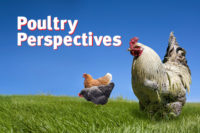Country of Origin Labeling (COOL) has mandated that retailers notify their customers with information regarding the source of certain foods, including seafood, nuts and fresh meat derived from beef, veal, pork, lamb, goat and chicken.
Although mandatory labeling may seem simple, complying with the labeling requirement will require fundamental structural changes in the meat industry that were never intended by Congress.
The problem is that the requirements, particularly new ones announced in May, are so complicated that they actually put the U.S. in conflict with its closest trading partners — Canada and Mexico — who all share the same North American land mass and are, for all intents and purposes, a single, interconnected industry.
Mandatory COOL violates World Trade Organization (WTO) standards because the segregation it requires causes discrimination against product derived from livestock born outside the U.S. Both Canada and Mexico have promised trade retaliation and are making a successful case for it with the WTO.
The new COOL rules require all production steps to be on labels, not just where the meat was processed, but where the animal was “born, raised and slaughtered.” Such information requirements virtually eliminate commingling and create huge problems throughout the supply chain for segregating and tracking. As a result, cost will rise dramatically, and small players are at risk of going out of business. And, because COOL only covers retail, unprocessed products, it is going to have an uneven impact.
The new COOL rules will have a huge negative impact on members of the North American Meat Association (NAMA). In fact, these new requirements of that rule are so onerous that nine organizations, including NAMA, have filed suit in the U.S. District Court for the District of Columbia to block implementation. In the legal complaint, the nine organizations explain that the final rule violates the United States Constitution by compelling speech that does not directly advance a substantial government interest.
Unfortunately, the District Court denied a preliminary injunction in the case.
“This decision [against a preliminary injunction] will have real consequences, and, at a time of rising meat prices and record-low herd size, they will be damaging,” said NAMA CEO Barry Carpenter. “In the absence of preliminary relief, NAMA members and the industry at large will suffer irreparable harm.”
NAMA and the other plaintiffs still believe that the law is on our side in this matter. We intend to appeal this decision to protect the interests of our members.
The U.S. Department of Agriculture COOL rule is in violation of the First Amendment and is arbitrary and capricious, said the associations in their filing. The rule imposes vast burdens on the industry with little to no countervailing benefit. It is compelling speech, in the form of costly and complex labels that do not directly advance a government interest.
Under the U.S. Constitution, commercial speech may be compelled only where it serves a substantial government interest — for example, if the compelled speech is aimed at preventing the spread of a contagious disease. Because these labels offer no food-safety or public-health benefit, yet impose costs the government modestly estimates at $192 million, the government cannot require them.
This is especially true because all livestock and meat processed at federally inspected establishments in the United States and sold in interstate commerce are subject to the same health and safety requirements, as prescribed by the Federal Meat Inspection Act and the Poultry Products Inspection Act.
“Those products are also graded for quality according to a system administered by AMS [Agricultural Marketing Service] without variation based on where an animal was born or raised,” the complaint explains. “In short, beef is beef, whether the steer or heifer was born in Montana, Manitoba, or Mazatlán. The same goes for hogs, chickens and other livestock.”
In addition to violating the Constitution, the new rule also violates the Agricultural Marketing Act by exceeding the authority granted to USDA in the 2008 Farm Bill. While Congress mandated COOL, the statute does not permit labels that detail where animals were born, raised and slaughtered — yet that is what USDA will now require.
Finally, the COOL rule is arbitrary and capricious. It will fundamentally alter the meat industry and pick winners and losers in the marketplace with no benefit to anyone — and at great harm to many meat companies, especially those located along U.S.-Mexico or U.S.-Canada borders.
Those companies depend upon a steady supply of livestock that may have been born in another country. For example, some Texas-based companies that rely on Mexican-born, but U.S.-raised and -slaughtered cattle will incur dramatic segregation costs that place their businesses at serious risk. Meatpacking companies along the U.S.-Canadian border will face the same issue. And because retailers must implement the new labeling requirement, they too will face onerous segregation burdens in ensuring that meat from animals with multiple countries of origin is not packaged together.
The legal argument boils down to these three points:
- COOL violates the First Amendment protection from compelled speech: The government may only compel speech when there is a substantial government interest such as food-safety or public-health protection. USDA has repeatedly stated that COOL is not a food-safety labeling issue. Consumer curiosity is not a substantial government interest.
- COOL violates the statute: The COOL statute passed by Congress mandates origin labels but does not permit that countries where production steps occurred be listed. The COOL statute does not require packers to abstain from the practice of “commingled” packaging, but the new regulations have that effect.
- COOL violates the Administrative Procedure Act (APA): The rule will provide inaccurate information to consumers, harm the industry and doesn’t address concerns expressed by the WTO or by Canada and Mexico. It ultimately picks winners and losers in the market, fundamentally altering the meat industry with no identifiable consumer benefit.
As well as NAMA, plaintiffs in the suit include the American Association of Meat Processors, American Meat Institute, Canadian Cattlemen’s Association, Canadian Pork Council, Confedaracion Nacional de Organizaciones Ganaderas, National Cattlemen’s Beef Association, National Pork Producers Council and the Southwest Meat Association.
For more information on the North American Meat Association, visit www.meatassociation.com.








